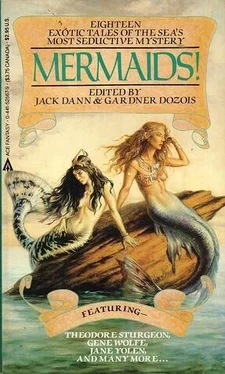Гарднер Дозуа - Mermaids!
Здесь есть возможность читать онлайн «Гарднер Дозуа - Mermaids!» весь текст электронной книги совершенно бесплатно (целиком полную версию без сокращений). В некоторых случаях можно слушать аудио, скачать через торрент в формате fb2 и присутствует краткое содержание. Год выпуска: 1986, ISBN: 1986, Издательство: Ace, Жанр: Фантастика и фэнтези, на английском языке. Описание произведения, (предисловие) а так же отзывы посетителей доступны на портале библиотеки ЛибКат.
- Название:Mermaids!
- Автор:
- Издательство:Ace
- Жанр:
- Год:1986
- ISBN:0-441-52567-9
- Рейтинг книги:5 / 5. Голосов: 1
-
Избранное:Добавить в избранное
- Отзывы:
-
Ваша оценка:
- 100
- 1
- 2
- 3
- 4
- 5
Mermaids!: краткое содержание, описание и аннотация
Предлагаем к чтению аннотацию, описание, краткое содержание или предисловие (зависит от того, что написал сам автор книги «Mermaids!»). Если вы не нашли необходимую информацию о книге — напишите в комментариях, мы постараемся отыскать её.
Mermaids! — читать онлайн бесплатно полную книгу (весь текст) целиком
Ниже представлен текст книги, разбитый по страницам. Система сохранения места последней прочитанной страницы, позволяет с удобством читать онлайн бесплатно книгу «Mermaids!», без необходимости каждый раз заново искать на чём Вы остановились. Поставьте закладку, и сможете в любой момент перейти на страницу, на которой закончили чтение.
Интервал:
Закладка:
"Sightings" 5 and 6 are not precisely dated, but please keep clear that these seven reports refer to seven different beings! I could give more, but perhaps these will suffice. Perhaps, too, in reading these mid-19th century reports you will be reminded of the one dated 1197. "At Oreford, in Suffolk," something called "a fish," although "resembling in shape a wild or savage man," was taken in a fishnet, and " he would not or could not utter any speech... " And perhaps, too, you recalled at once the incident at Edam in 1403, when the dike broke. "A mermaid floated in ... she never spake, but lived dumbe for fifteen years ; then she died." I had suggested that perhaps these two, and perhaps others, were what are usually termed deaf-mutes (I believe that a term preferred today is, "deaf people who cannot speak"). They might also have been suffering from another form of speechlessness, not congenitally so; "mute by the visitation of God," but perhaps through shock (shipwreck, for example). Do I suggest the same for the seven I cite from the 19th century? It is time for me to reveal my source for these seven; it is the book called Wolf-Children and Feral Man ; printed in 1942 by the University of Denver, and "Reprinted 1966 in an Unaltered and Unabridged Edition [by Archon Books] With Permission of Harper and Row, Inc." It is two books in one. The first part entitled The Diary of the Wolf-Children of Midnapore (India) , by the Reverend J. A.L. Singh / Missionary S.P.G. [Society for the Propagation of the Gospel] Mission and the Rector / The Orphanage, Midnapore / Bengal, India / with a Preface by / The Right Reverend H. Pakenham-Walsh (Bishop) / Christa Ishya Ashram, Tadagam, P.O. Coimbatore, India / and I Appendix, Chronology of the Wolf-Children ; the second part is called Feral Man and Cases of Extreme Isolation of Individuals , by Robert M. Zingg, Ph.D. / University of Denver / Author of the Huichols: Primitive Artists / Forewords / Professor R. Ruggles Gates, Ph.D., D.Sc., LL. D., F.R.S. / King's College, University of London, Chairman, Human Heredity Bureau, London / Professor Arnold Gesell, M.D., Director / Clinic of Child Development, The School of Medicine / Yale University, New Haven, Connecticut / Author of Wolf Child and Human Child / Professor Frances N. Maxfield, Ph.D. / Director of Psychological Clinic / Ohio State University, Columbus, Ohio / Professor Kingsley Davis, Ph.D. / Associate Professor of Sociology / The Pennsylvania State College...
I have copied the entire subtitle page, unusually long for a modern book, on purpose in order to make it clear that whatever else it may or may not be, Wolf-Children and Feral Man is not a mere rip-off from some volume of forgotten lore, and neither are its authors and foreworders loonies or zanies. If a more respectable group sacred and secular can be found... well....
Stories of human children raised by animals are as ancient as Romulus and Remus and more modem than Tarzan. All seven reports cited here from the 19th century are from India, and all refer to alleged "wolf-children." There are, as I say, more. Sources include two rajahs, and Gen. Sir William Sleeman, best known for his successful campaign to suppress thuggee. He and the rajahs were believers. Skeptics included Dr. John Whishaw of the Lucknow (India) Lunatic Asylum, who bluntly wrote in 1874, "The majority of wolf-boys are idiots, taken by their parents and left near some distant police station." Even this skeptical statement avoids absolute finality with the words, The majority . I take no sides. The matter is immense, and immensely complex. Read the book.
The Rev. Mr. Singh's part of the book refers to two girl-children he said he and jungle villagers rescued from a wolf's den in Bengal in 1920, and which he and his wife certainly raised and cared for; one died young, the other lived about nine years; and was (with infinite patience) taught to walk on two feet, to speak about 40 words, an otherwise to behave as a human being, albeit always a strange one. Prof. Zingg's part of the book covers the whole field of wild men, wild women, wild children, "feral man," and people raised in isolation from others; is there one word in the whole book regarding, specifically, mermaids? —not a single one, as far as I could see: why, then, am I writing of it in this connection?
Serendipity enters, yet again. Looking for data in connection with my hypothesis that at least some of the "mermaids" or "mermen" found and cared for might really have been human beings unable to speak and/or hear, I sought a few specific books on the treatment and education of the deaf and the mute. None of them were on the library shelves, but near to where they would have been was the book Wolf-Children and Feral Man . I took it down, I opened it, I read a few words, I took it out....
I learned a lot.
We observe in five of these reports, from Europe and Asia, that the strange beings had this in common: they were found by water : and they could not speak . I acknowledge that in none of the four cases was mention made of a tail, fish-like or otherwise. I would hasten to point out that the Encyclopedia Britannica emphasizes that in a very large number of mermaid legends the merperson has no tail... but I do not exactly hasten, because in these legends he or she invariably does speak.
["They could, however, assume human shape occasionally, and in some forms of the tradition, they were without tails."]
And one of the things which, usually, she says is, in effect, "Very well, I will marry you, but on condition that you do not watch me" do this or that: in Chinese and Japanese werefox-witch stories the act forbidden to be watched is eating, in Western European mermaid stories it is bathing. A very old variation on this is the non-Scriptural story that the Queen of Sheba had (a) hairy feet, or (b) webbed feet (this latter pops up again with la reine pedauque as the ancestress of Charlemagne), or (c) hooved feet. As she never lifted her long skirts at all, King Solomon took her to a part of the palace where the floor was of polished blue marble: " Water! " cried the Sheban queen, hoisting her hems to avoid wetting them. Thus showing all. It is entirely possible that a person afflicted with an abnormality of the feet might not wish them to be seen even by a spouse; and the aspect of the legend wherein the "mortal" spouse eventually peeks and sees the fishy-tail, whereupon the mer-spouse dives into the moat and vanishes, may rest upon just such a circumstance. A fishy-tail, though more abnormal, is more dramatic than a clubfoot. (The fox-witch-woman, on the other hand, reveals her true self by dining on a single grain of rice: an economical but, under the circumstances, undesirable trait.)
Clear across the Old World, from England to Japan, rivers were worshiped ... and feared. Sometimes they demanded human sacrifice; sometimes they got them. Suppose, then, a strange person, unable to speak and to "give an account of oneself," being found near a river... near any water, for that matter... why, he or she would almost of necessity be subsumed into that awe of the sacred and the terrible. I leave this to be considered, and I pass on.
Professor Zingg writes: "The term and concept of feral man (L. ferus, "wild") was first taken from the realm of myth and history into organized science by the great scientific systematizer, Carl Linnaeus (b. 1707, d. 1778). He included Homo sapiens ferus in the tenth and subsequent editions of his early and great work, Systema Naturae , 1758. He considers Homo ferus (generally given elsewhere as Homo sapiens ferus ) as a subdivision of Homo sapiens in the order of the primates, which includes man and the apes..."
Читать дальшеИнтервал:
Закладка:
Похожие книги на «Mermaids!»
Представляем Вашему вниманию похожие книги на «Mermaids!» списком для выбора. Мы отобрали схожую по названию и смыслу литературу в надежде предоставить читателям больше вариантов отыскать новые, интересные, ещё непрочитанные произведения.
Обсуждение, отзывы о книге «Mermaids!» и просто собственные мнения читателей. Оставьте ваши комментарии, напишите, что Вы думаете о произведении, его смысле или главных героях. Укажите что конкретно понравилось, а что нет, и почему Вы так считаете.











![Гарднер Дозуа - Книга Мечей (сборник) [litres с оптимизированной обложкой]](/books/427839/gardner-dozua-kniga-mechej-sbornik-litres-s-opti-thumb.webp)